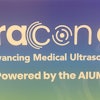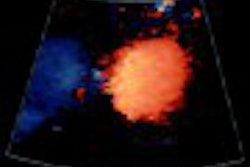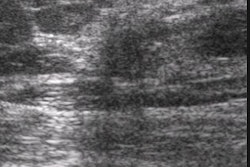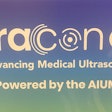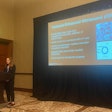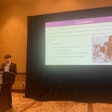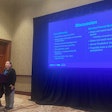When it comes to ultrasound reimbursement, the American Medical Association (AMA) has spoken, and radiologists are taking the organization's recent House of Delegates resolution with varying levels of concern.
The resolution, unanimously approved in June, urges the AMA to "vigorously advocate with Medicare and other payors that all appropriately trained physicians -- regardless of specialty -- be reimbursed for performing diagnostic sonography...in situations with defined clinical indications."
As with other medical dilemmas, the devil is in the details. How is an "appropriately trained physician" defined? Who does the defining?
The American College of Radiology of Reston, VA, isn't planning to oppose reimbursement for ultrasounds performed by physicians other than radiologists, but the society plans to work with other medical societies to ensure that professional standards are maintained.
"The college can’t oppose other physicians doing ultrasound, because that type of action would be a restraint of trade. What the college objects to is physicians not having the same level of ultrasound training as radiologists, but purporting to have that training and then billing for it. We wouldn’t think that was in the best interests of the patients," said Dr. A. Van Moore, Jr., the secretary-treasurer of the ACR and chair of the ACR’s delegation to the AMA. Moore also is the president of Charlotte Radiology in North Carolina.
He pointed to the ACR’s accreditation programs, and said that the organization is working with other medical societies, when possible, to develop uniform accreditation programs for several types of imaging modalities, including ultrasound. The requirements of those programs are listed on the ACR’s Web site.
Defining training
Will these collegial efforts be sufficient to quell radiologists’ concerns? In individual interviews with AuntMinnie.com, several radiologists discussed their reactions to the AMA ruling and its impact on quality of care.
Some physicians felt that the AMA resolution opened the door for compromises in ultrasound care, and may open the door for opportunistic self-referral.
"Self-referral is one issue," said Dr. Harvey Clewans, chief of chest radiology for the residency program at State University of New York-Buffalo. "Another is training and experience. The knowledge of the imaging equipment is something you get in training. From a radiologist’s point of view, whether or not nonradiologists get reimbursed for ultrasound is an issue of appropriate training and experience, which are acquired as the result of doing a lot of cases. (The AMA resolution) would allow people to bill for ultrasounds who may not have had to meet the same standards of training."
Dr. H. Robert Reno echoed the concern that Clewans raised regarding self-referral. "There is a real problem when people who interpret studies are also allowed to order them," he said. "This resolution opens the door for that kind of abuse."
"I think any physician who’s properly trained in any modality should be allowed to do it, but the term of importance is ‘properly trained.’ A physician should go through a formal course," added Reno, a staff radiologist at Brandon Regional Hospital in Tampa, FL.
An old battle
The resolution reflects historical tensions between the AMA and radiologists, according to Dr. Edwin Goldstein, a radiologist in Mesa, AZ.
"The AMA has not been friendly historically to radiology," he said. "In fact, this stance has carried over into medical training programs. Radiologists are bound to train personnel other than radiologists, such as cardiologists who wish to learn how to do angiography. The ultrasound issue is more of the same. It’s not a surprise to me."
But it may not matter who does the exams if the individual is not adequately trained in ultrasound imaging techniques.
"The real issue is not whether a few physicians who want to do ultrasound should be allowed," commented one Southern California-based radiologist who asked not to be identified. "The real issue is, can we make it so that, if other physicians want to perform ultrasound and charge for it, that they will meet the same standards as radiologists. One of the problems you can run into is that some people...don’t keep any films. We in radiology are used to having our examinations being stored on films or digitally archived. If you don’t keep any films, nobody can find out if you were wrong."
Rather than focusing strictly on reimbursement, more-useful legislation would require that any physician who bills for ultrasound exams must meet certain professional requirements, and archive their images. "It’s important to keep out those who just want to perform ultrasound for the money and don’t care about patient care," the Southern California radiologist said.
The AMA’s resolution does have its supporters within the imaging community, notably the American Institute of Ultrasound in Medicine of Laurel, MD.
"The American Institute of Ultrasound in Medicine was in favor of the resolution, as this will benefit its physician members," said Marilyn K. Laughead, the AIUM’s alternate delegate to the AMA House of Delegates. Laughead is an obstetrician-gynecologist who practices in Scottsdale, AZ. She explained that as the AIUM is a cross-specialty organization, it supports all physicians who use ultrasound in their practices.
By Paula MoyerAuntMinnie.com contributing writer
August 8, 2002
Related Reading
Multidisciplinary boards might calm radiology's raucous turf battles, August 1, 2002
AMA calls for reimbursement for all ultrasound exams, July 11, 2002
Research and education will win the radiology turf wars, according to Dunnick, July 8, 2002
Turf Wars in Radiology, Part III: All is not lost in nuclear cardiology, August 31, 2001
Turf Wars in Radiology, Part I: Rads, attendings duke it out in the ER, August 10, 2001
Copyright © 2002 AuntMinnie.com


